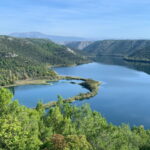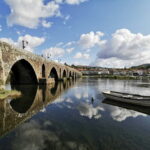Traces of Memory: Jewish Heritage in Portugal
Embark on a journey through Portugal’s cities and villages to uncover centuries of Jewish presence—woven into the fabric of national history, cultural identity, and the Age of Discoveries.
From the 5th to the 15th century, the Sephardic Jewish community—Jews of the Iberian Peninsula—settled throughout what is now Portugal. Their contributions enriched the country’s economic, scientific, and cultural foundations, influencing both the rise of the Portuguese nation and its maritime expansion.
Let us guide you through the most emblematic places where Jewish history still speaks—through architecture, stories, and enduring traditions.
Porto: Echoes of Faith Along the Douro
As a vital port and thriving commercial hub, Porto attracted a significant Jewish population. Tracing their legacy begins in the city’s historic heart, among winding alleyways and hidden corners.
Porto’s first synagogue once stood near what is now Rua de Santana. As the community grew, it extended toward the river, establishing another Jewish quarter near Palácio da Bolsa and the old Mercado Ferreira Borges.
Further exploration leads to the Olival quarter, where the former Cadeia da Relação—now the Portuguese Centre of Photography—once bordered a vibrant Jewish community. Nearby, the imposing Mosteiro de São Bento da Vitória was built atop former Jewish lands. A visit to the Miradouro do Largo da Vitória offers sweeping views of the city and the Douro River.
End your tour in Boavista, home to the Kadoorie Mekor Haim Synagogue—the largest in the Iberian Peninsula. Built between 1929 and 1937, it remains the spiritual and cultural center of Porto’s Jewish community.
The Douro Valley: Hidden Legacies in Hilltop Towns
In the Douro region, Lamego stands as a key site of Jewish heritage. Despite its strong Catholic roots, Lamego was once home to over 400 Jews in the 15th century, living between the castle and the Church of Santa Maria de Almacave. The city hosted two Jewish quarters—one near Porta do Sol and another along today’s Rua Nova, where remnants like Gothic arches hint at synagogues long past.
Beyond Lamego, Jewish communities once flourished in Torre de Moncorvo, Vila Flor, Freixo de Espada à Cinta, Vila Real, and São João da Pesqueira.
In Vila Nova de Foz Côa, stroll near the castle and visit the Chapel of Santa Quitéria, now standing where a synagogue once served its community.
Belmonte: Faith in Secrecy, Identity in Silence
Cose to the Serra da Estrela mountains, Belmonte is a unique chapter in Jewish history. In the 16th century, Jews in Portugal faced forced conversion or exile under King Manuel I. Many outwardly embraced Christianity while secretly preserving their traditions—these were the so-called Marranos.
Belmonte’s Jewish community remained hidden for centuries, preserving their customs in secret. It wasn’t until the 1970s that they reconnected with the global Jewish community and formally returned to practicing Judaism.
Today, the medieval ambiance of Belmonte whispers of the time when its Jewish residents lived dual lives—one public, one private, both deeply rooted in faith.
Tomar: Portugal’s Oldest Synagogue
Tomar, the former seat of the Knights Templar, is a small city rich in architectural and religious heritage. Among its narrow streets lies Portugal’s oldest existing synagogue, built in 1438.
A discreet, square-shaped building, its twelve arches represent the twelve tribes of Israel, while four interior columns symbolize the Matriarchs. After the 1496 expulsion edict, the synagogue was repurposed several times before being declared a national monument in 1921.
In 1939, Polish-Jewish mining engineer Samuel Schwartz restored and donated it to the state, and it became the Museu Luso-Hebraico de Abraão Zacuto. The museum honors the astronomer and mathematician whose work supported Portuguese navigation during the Age of Discoveries.
Lisbon: Layers of Memory in the Capital
Lisbon’s Jewish legacy begins in the Alfama district, where Judiaria Grande once thrived. A second community—Judiaria Pequena—arose in the 13th century near today’s Praça do Comércio, though the area was destroyed by the 1755 earthquake.
At Praça do Rossio, a memorial honors the victims of the 1506 massacre, when thousands were killed during anti-Semitic violence.
The magnificent Praça do Comércio, now a serene spot by the Tagus River, was once the site of mass forced baptisms.
Lisbon’s Jewish revival began in the 19th century with the arrival of Sephardic Jews from Morocco and Gibraltar. In 1904, they built the Shaaré Tikvah Synagogue (Gates of Hope)—Lisbon’s first synagogue since the 15th century. Hidden from the street in accordance with the law of the time, it became a sanctuary for refugees during World War II and remains the heart of Jewish life in the capital.
Castelo de Vide: A Village Preserved in Time
Nestled in the Alentejo hills, Castelo de Vide boasts one of the most intact medieval Jewish quarters in Portugal. Its Jewish community expanded in the late 15th century with refugees fleeing Castile.
The town’s layout preserves its dual-purpose homes: street-level shops with upper-level living spaces. At the intersection of Rua da Judiaria and Rua da Fonte stands a modest building believed to have been the synagogue. Today, it houses a museum dedicated to the local Sephardic heritage.
From the castle walls, take in sweeping views of the surrounding countryside—a landscape that once offered protection and isolation to a people determined to keep their faith alive.
These towns and cities preserve a story of endurance, identity, and cultural richness. From medieval synagogues to living communities, the Jewish heritage of Portugal is ready to be discovered.
Contact our team to craft your personalized itinerary and explore the hidden paths of Jewish history across Portugal.





